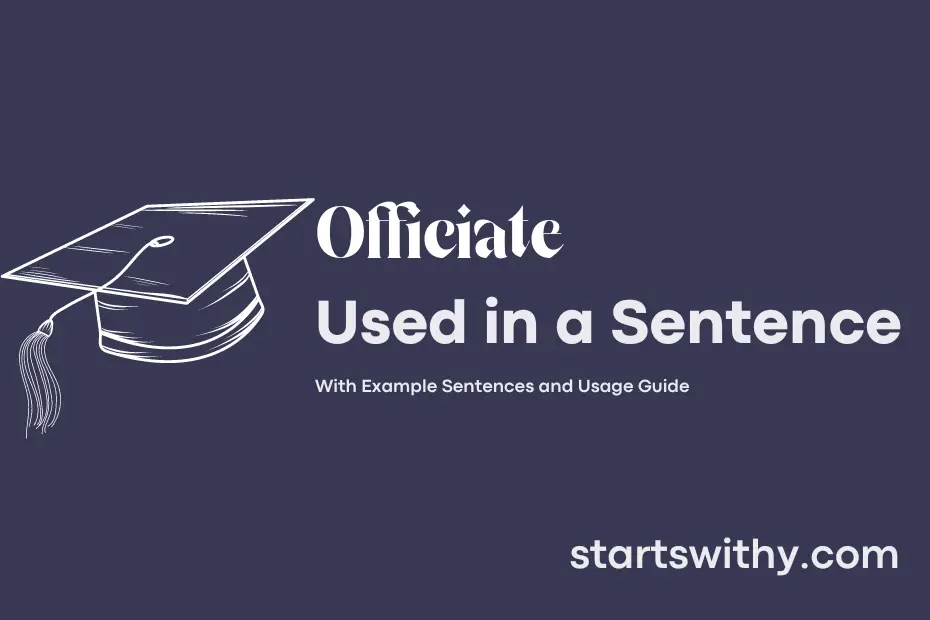Have you ever witnessed a wedding ceremony where someone is leading the proceedings and overseeing the exchange of vows? That individual is often referred to as the officiant.
To officiate means to perform a formal and legal ceremony, often with religious or civil significance. It can involve solemnizing marriages, presiding over official events, or leading rituals with symbolic importance. Officiating requires authority and the ability to guide a group through the process with expertise and decorum.
7 Examples Of Officiate Used In a Sentence For Kids
- The priest will officiate the wedding ceremony.
- The judge will officiate the court proceedings.
- The teacher will officiate the school function.
- The referee will officiate the sports game.
- The principal will officiate the school assembly.
- The mayor will officiate the town event.
- The minister will officiate the religious service.
14 Sentences with Officiate Examples
- Officiate the inter-college basketball match for fair play.
- The faculty member will officiate the debate competition.
- I would like to officiate the next cultural event.
- The student council president will officiate the oath-taking ceremony.
- The senior professor will officiate the graduation ceremony.
- The sports captain will officiate the relay race.
- The head of the drama society will officiate the play rehearsal.
- The dance teacher will officiate the dance competition.
- I have been asked to officiate the talent show.
- The student body president will officiate the annual fest.
- The event coordinator will officiate the quiz competition.
- The class representative will officiate the farewell party.
- The teacher will officiate the symposium.
- The club president will officiate the music concert.
How To Use Officiate in Sentences?
To Officiate means to perform a ceremony or lead a formal event in an official capacity. When using this word in a sentence, you can follow these simple guidelines:
-
Verb form: When using Officiate as a verb, it typically refers to someone conducting a ceremony or event. For example, “The priest will officiate the wedding ceremony.”
-
Past tense: If you want to talk about the act of officiating that has already taken place, you can use the past tense form. For instance, “He officiated the graduation ceremony last night.”
-
Adjective form: You can also use the term Officiate as an adjective to describe someone who is currently performing an official role. For example, “The officiating judge has the final say in the competition.”
-
Noun form: In some cases, Officiate can also be used as a noun. For instance, “The officiate led the opening ceremony with grace and dignity.”
Remember to match the tense and form of Officiate to the context of your sentence. Whether you are writing about a wedding, a sports event, or any other formal gathering, using this word correctly will help you communicate effectively.
Conclusion
In summary, the term “officiate” refers to the act of performing an official duty or service, such as presiding over a ceremony or event. Examples of sentences using “officiate” include: “He will officiate the wedding ceremony next weekend.” “The referee officiated the football match fairly and impartially.” “The judge will officiate the oath-taking ceremony.”
Overall, the word “officiate” is commonly used in contexts where someone is given the authority to oversee or conduct a formal procedure. Whether it’s a wedding, sporting event, or legal proceeding, officiating plays a crucial role in ensuring the orderly and legitimate conduct of various activities.



